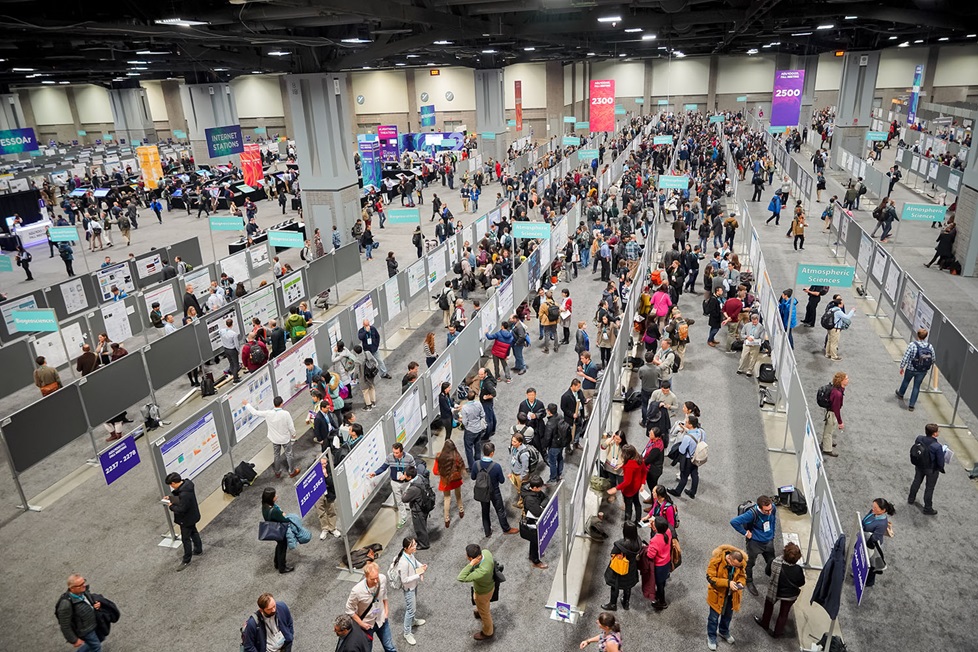
Fall Meeting abstracts
About Fall Meeting 2019
Fall Meeting 2019 will bring together people from around the globe and across the Earth and space sciences to celebrate our past discoveries, share our present research, and inspire the future of science and beyond. Together we stand at the intersection of where we have come from and where we are going. Join us at Fall Meeting 2019: “Celebrate the Past, Inspire the Future.”
Please note: AGU is committed to safeguarding our members’ privacy and safety. Our Master Privacy Policy was updated on 25 May 2018 in response to the European Union’s General Data Protection Regulation (GDPR).
Abstract submissions are now closed. View sessions and submitted abstracts.
Abstract authors will be notified of acceptance, format, and schedule in early October.
Help send students to Fall Meeting
Join the Austin Student Travel Grant Challenge and help advance students’ careers. Gifts matched up to $1 million!
Donate NowAuthor guidelines and related policies
The person submitting the abstract will automatically be the first author. You may not submit an abstract on behalf of another author. The first author cannot be modified for any reason.The first author, including invited authors, must be an AGU member. Membership requirement exceptions are granted if you are a member of one of the below co-sponsoring organizations or GeoHealth cooperating societies. Note that you will still have to pay the abstract fee.
Coauthors or presenting authors who are different than the first author are not required to be an AGU member. The abstract submitter is responsible for ensuring that all coauthors have agreed to be on the abstract.
A research team may be referenced during the submission process in the “Title of Team” field, in lieu of adding the names of individual team members.
The abstract submission fee is separate from membership dues. If you are paying your membership by credit card, you will have immediate access to the abstract submission site.
Note: The session you submit your abstract to might not be the session you present in. In order to optimize the organization and scheduling of the meeting, abstracts may be transferred to more appropriate sessions while similar sessions may be merged and renamed.
View the Fall Meeting Program Committee.

First author policy
First authors can have a maximum of one contributed and one invited abstract or two invited abstracts. The only exemption to this policy is the submission of one additional contributed abstract to a GeoHealth (GH) session, Education (ED) session, Public Affairs (PA) session, or, for 2019, a Centennial SWIRL session.
Possible combinations for people submitting more than one abstract are as below:
- 2 Abstracts:
- 1 regular contributed abstract to any session and 1 invited abstract to any session
- 1 regular contributed abstract to any session and 1 regular contributed abstract to an ED, GH, PA, or Centennial SWIRL session
- 3 Abstracts:
- 1 regular contributed abstract to any session, 1 invited abstract to any session, 1 regular contributed abstract to ED, GH, PA, or Centennial SWIRL session
- 2 invited abstracts to any session, 1 regular contributed abstract to ED, GH, PA, or Centennial SWIRL session
AGU membership
The first author, including invited authors, must be an AGU member. Exceptions are granted to members of the below co-sponsoring organizations or GeoHealth cooperating societies.
Coauthors or presenting authors who are different than the first author are not required to be an AGU member.
If you have a question on your membership status, need to join or renew, or need assistance with your AGU membership account, contact the AGU Membership Services Team by email or call 800.966.2481 (toll-free in North America) or +1 202.462.6900.
GeoHealth cooperating societies
AGU has agreements with select cooperating societies within specified sections. If you are a member of one of the below societies the AGU membership requirement for first authors will be waived. Abstract fees will still apply. Also note that you may be a first author on more than one abstract if one of those abstracts is for GeoHealth.
Invited authors must be AGU members and up to date with 2019 membership dues; however, special exemptions may be requested. Please contact AGU by email or call 800.966.2481 (toll-free in North America) or +1 202.462.6900 as soon as possible for requesting an exemption. Depending on timing and volume, we cannot guarantee that all requests will be approved.
American Public Health Association (APHA)
Federation of American Societies for Experimental Biology (FASEB)
International Society for Environmental Epidemiology (ISEE)
International Society for Exposure Science (ISES)
Conveners submitting abstracts
Conveners are allowed to submit abstracts to their own session but are not allowed to be invited authors to their own session or schedule themselves as an oral presentation.
The abstract submission fee and the first-author policy referenced above are still applicable. For instance, if you are a convener on two (2) sessions outside of the ED/GH/PA programs and you wish to submit an abstract to both of your sessions, you will be able to submit an abstract to only one session due to the first-author policy above.
There are no restrictions on a convener’s ability to submit an abstract to a session other than their own.
If a session receives multiple oral or poster session allocations, session conveners can retroactively mark up to two abstracts as “Highlighted” per each additional session during the scheduling period if needed.
Invited authors
Invited authors do not receive discounted abstract fees, registration fees, or travel reimbursement.
Invited authors must be AGU members and up to date with 2019 membership dues; however, special exemptions may be requested. Please contact AGU by email (link to [email protected]) or call 800.966.2481 (toll-free in North America) or +1 202.462.6900 as soon as possible for requesting an exemption. Depending on timing and volume, we cannot guarantee that all requests will be approved.
Invited authors are not guaranteed an oral presentation and may be assigned a poster presentation.
Please note that certain authors may be marked as “Highlighted Authors” after submissions close.
Invited authors will receive an electronic invitation from the session convener via the submission site. The invitation will include a link to the session; please submit the abstract via the link included in the invitation. If the abstract is not submitted through the formal invitation, the abstract will not have an invited status listing. If you have submitted your abstract to the session as a contributed abstract in error, do not withdraw your abstract. Contact AGU’s scientific program staff to have the abstract status changed to Invited.
A person may not be invited to submit an abstract to more than two sessions.
A first author may not be an invited author or presenter on an abstract submitted to a session in which they are convening.
Members submitting an abstract as first author may not have an oral presentation in a session where they are also a convener.
Important note: Being an invited author does not guarantee that the person will receive an oral presentation unless it is a Union session. All invited authors are subject to being scheduled either in an oral or a poster session. If a session is given an oral allocation, which is also not guaranteed, the authors in that session and the length of presentations will be decided by the convener during the scheduling process.
Co-sponsoring organizations
If a session proposal is co-sponsored by one or more cooperating societies, members or constituents of those societies are able to submit as first author if they are not AGU members.
Members of these societies may join AGU or submit abstracts to the sessions co-sponsored by their respective societies. Members (who are not AGU members) must contact AGU by email (link to [email protected]) or call 800.966.2481 (toll-free in North America) or +1 202.462.6900 as soon as possible to request log-in credentials in order to submit an abstract to their societies’ co-sponsored sessions. Depending on timing and volume, we cannot guarantee that all requests will be approved.
American Astronomical Society (AAS)
American Meteorological Society (AMS)
Ecological Society of America (ESA)
European Geosciences Union (EGU)
Geochemical Society (GS)
International Association of Sedimentologists (IAS)
Japan Geoscience Union (JpGU)
Mineralogical Society of America (MSA)
National Association of Geoscience Teachers (NAGT)
Society of Exploration Geophysicists (SEG)
Society for Sedimentary Geology (SEPM)
Soil Science Society of America (SSSA)
World Climate Research Programme (WCRP)
Session and presentation type overview
There are two traditional types of sessions held during AGU Fall Meeting—oral and poster. During abstract submissions, you may select your preference for either a poster only or agree to be designated as a poster or oral by the Program Committee/session conveners.
Between 1 August and 1 October, the designated program committee section representative will determine the session type (poster session, or a combination of oral and poster). Session conveners will then review and arrange the abstracts in their own session to determine an abstract presentation type if allocated more than a poster session.
Please note: If you're submitting to an alternate format there's a chance that you will not receive a traditional 15-minute oral session. Alternate session formats are requested during the session proposal phase by the convener and must be confirmed through review by the Program Committee during session proposal acceptance in May or for panels, session scheduling in August.
-
The current formats that have an impact on the session type that can be requested by abstract submitters are eLightning, poster only, and short talks. These sessions may also be allocated an accompanying traditional oral or poster session.
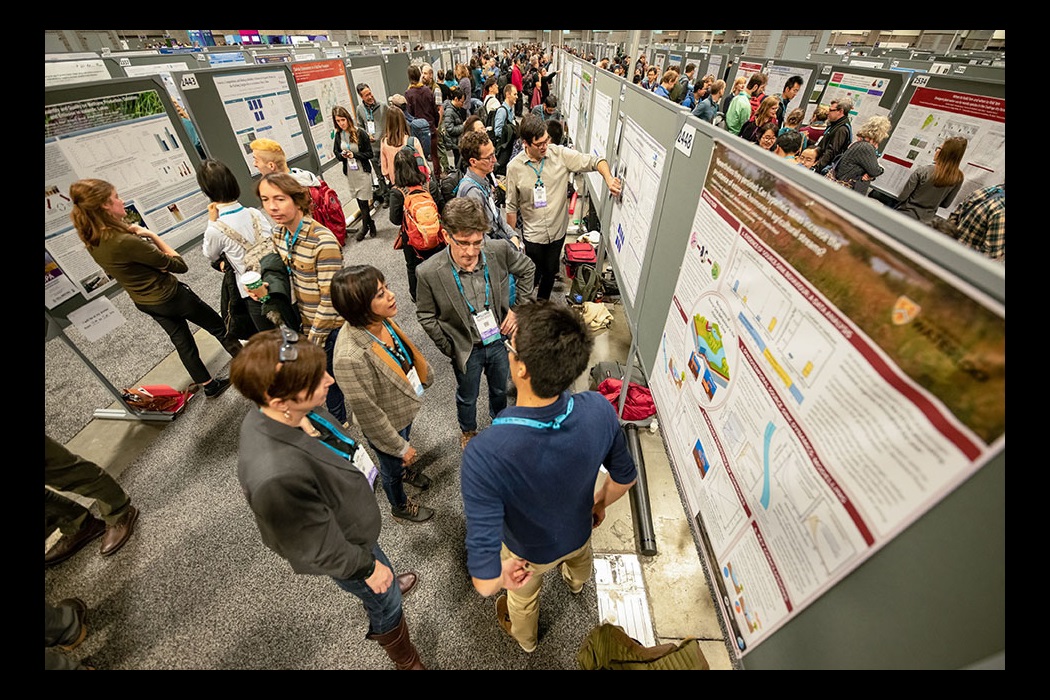
- Poster sessions receive half-day slots and will be displayed for a full day during the meeting but will be considered active only during the session time block. More than half of the presentations given at AGU Fall Meeting are poster sessions.
- Oral sessions receive a two-hour time slot. There are no one-hour sessions, except named lectures. Conveners may schedule these sessions with varying presentation lengths and as informal panels. Not all sessions receive an oral allocation.
- Panels are formal discussions in an oral session setting. Panels will be approved by the Program Committee after abstract submission and and are open to contributed abstracts. Abstracts not scheduled in an approved panel may be transferred to another session or scheduled in a poster session.
- Short talks are quick-changing oral presentations comprised of multiple five-minute talks or a mix of oral and poster presentations in an oral session setting.
- eLightning sessions are three-minute oral presentations, paired with digital, interactive, poster presentations.
- Poster only format selection indicates the convener requests only a poster session, without an oral session component.
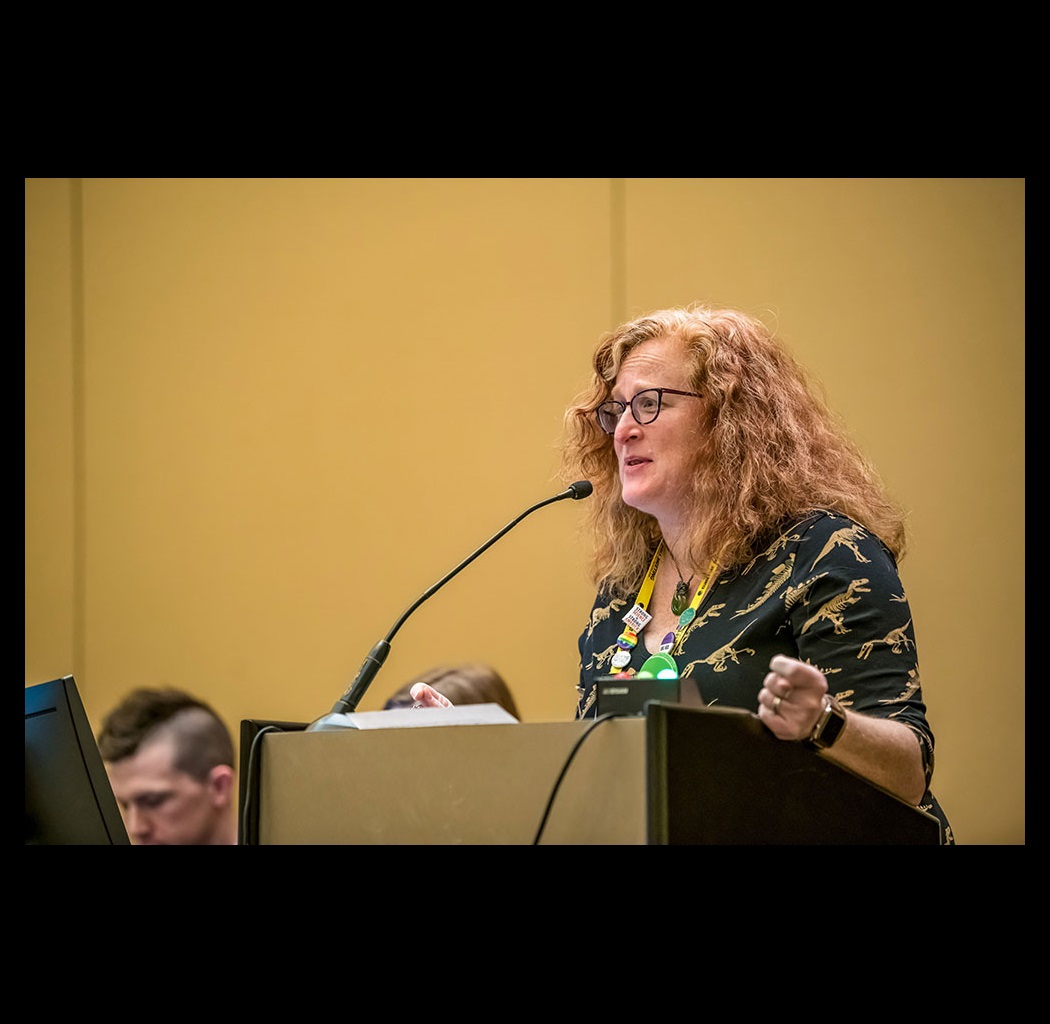
Alternate session formats
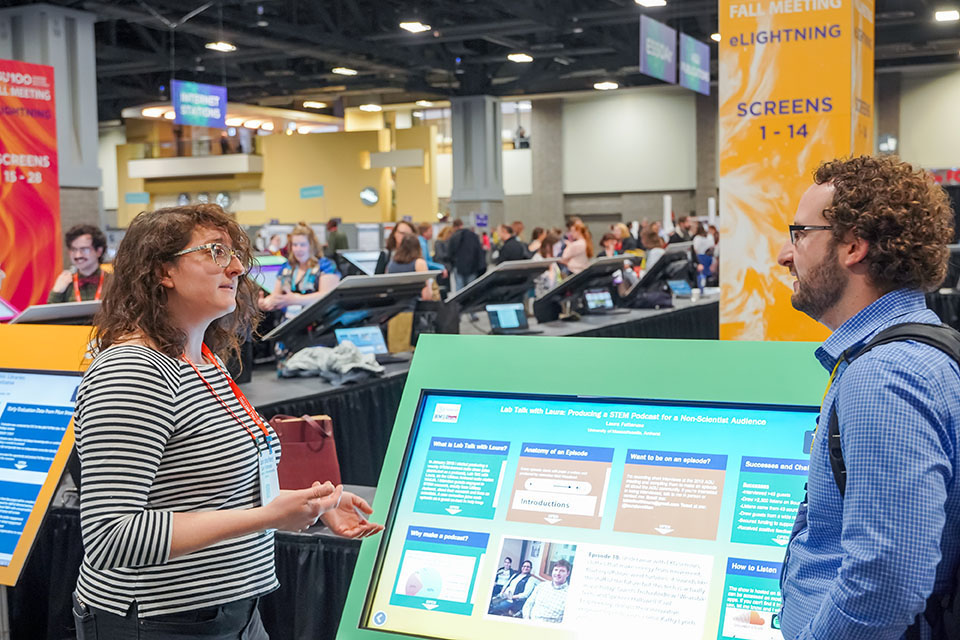
eLightning sessions
Recognizing that presenters at AGU meetings need solutions that encourage more in-depth discussions, allow for innovative multimedia options, and increase overall visibility, AGU has created a dynamic option to the traditional poster format. The “elightning” presentation concept expanded in 2018 to include more than 50 eLightning sessions presented in this format. These interactive electronic posters create an engaging experience for both presenters and attendees, providing significant additional value, including the ability to incorporate videos and audio recordings and to show complex data sets. Each eLighnting session will last two hours starting with a three-minute lightning presentation from each presenter, followed by group discussion and time with individual presenters at their touch screens for in-depth conversations with attendees.
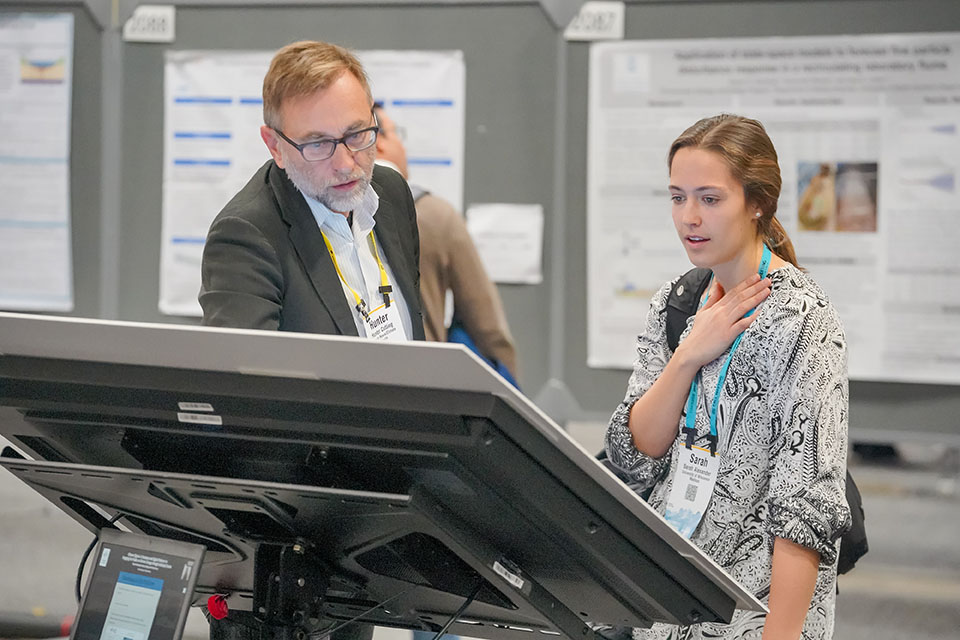
The 2019 eLightning Gallery is now live
Presentation type policies
Oral presentations cannot be requested. As noted above, these are assigned by the session conveners and Program Committee after all abstract submissions have been received.
Poster presentations may be requested. As noted above, these requests made during the abstract submission process will be honored by the conveners and Program Committee if the abstract is accepted.
Submission of an abstract carries with it the obligation to give a presentation in the designated manner assigned. This means that, if your abstract is accepted, it may be accepted as a poster presentation even though you had hoped for an oral presentation. It also grants AGU permission to publish the abstract.
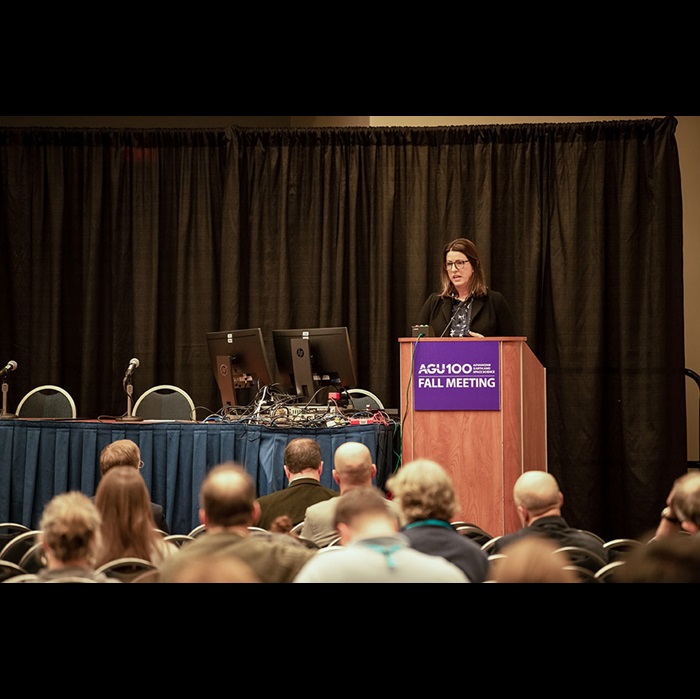
Once assigned by the program committee and scheduled by the session convener, the date and time of the presentation cannot be changed; presenters are advised not to arrange travel until acceptance notifications are sent in early October via email. Acceptance notifications will include information regarding assigned session dates and times. Please note that presentations may be assigned on any day: Monday, 9 December through Friday, 13 December.
To be the presenter of either an accepted oral or a poster presentation at the meeting, the individual must be listed as the “presenting author” on the abstract.
For panel sessions: All conveners are subject to the two invited author rule. Conveners may extend invitations to additional or specific panelists, however, those presenters will not receive invited author status, if needed, until after the panel session is approved in August. Please note: oral presentations are not guaranteed and all invited authors are required to submit an abstract.
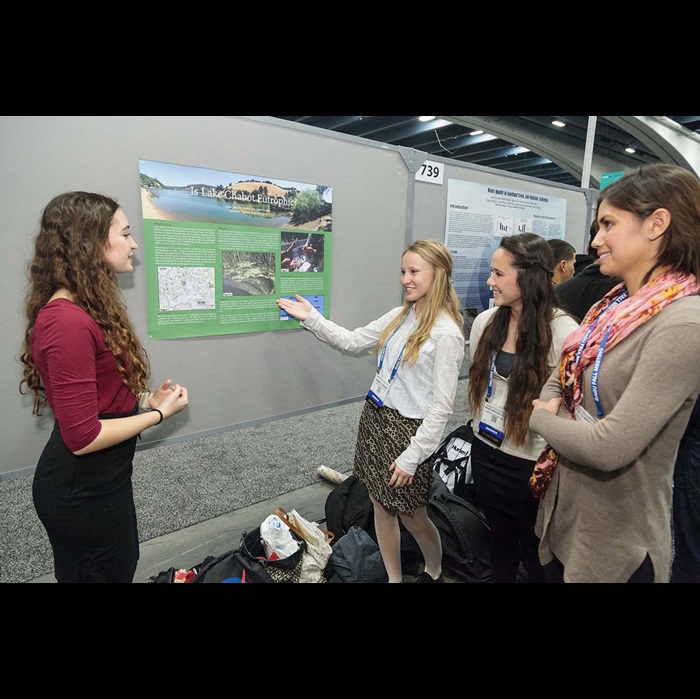
Abstract overview
Abstracts can focus on scientific results and/or their applications, enabling Earth and space science, and the impact of Earth and space science on society. The Program Committee may decline to consider an abstract with another focus. Highlighted this year: Centennial-focused sessions and the newly formed GeoHealth section will offer sessions at Fall Meeting.
Following the abstract deadline, a submitted abstract may be placed in a different, more appropriate session than the one to which it was submitted. Final decisions regarding placement of individual abstracts within sessions rest with the program committee.
To submit an abstract, you must be an AGU member.
Find out more about registration and housing, which will open in late August. Early bird registration rates end 7 November.
Letters of Invitation
Please note that if you have submitted an abstract for presentation, you may login in and download a letter of invitation. If you are not submitting an abstract and will be a registered scientist attending the meeting, please contact us to request a letter. Please note that we cannot provide letters of invitation to spouses, children, or others who will be accompanying you on the trip but not attending Fall Meeting as registered attendees.

Abstract content
The abstract title is limited to 300 characters and the abstract text is limited to 2,000 characters. The limit excludes spaces but includes punctuation. Please ensure you are selecting the correct affiliation and using the preferred email address for the co-author. Co-authors will receive a notification they have been added to an abstract.
Authors can add an optional plain language summary of their abstract with a maximum of 200 words.
LaTeX is supported. Special characters are also available in the abstract management system.
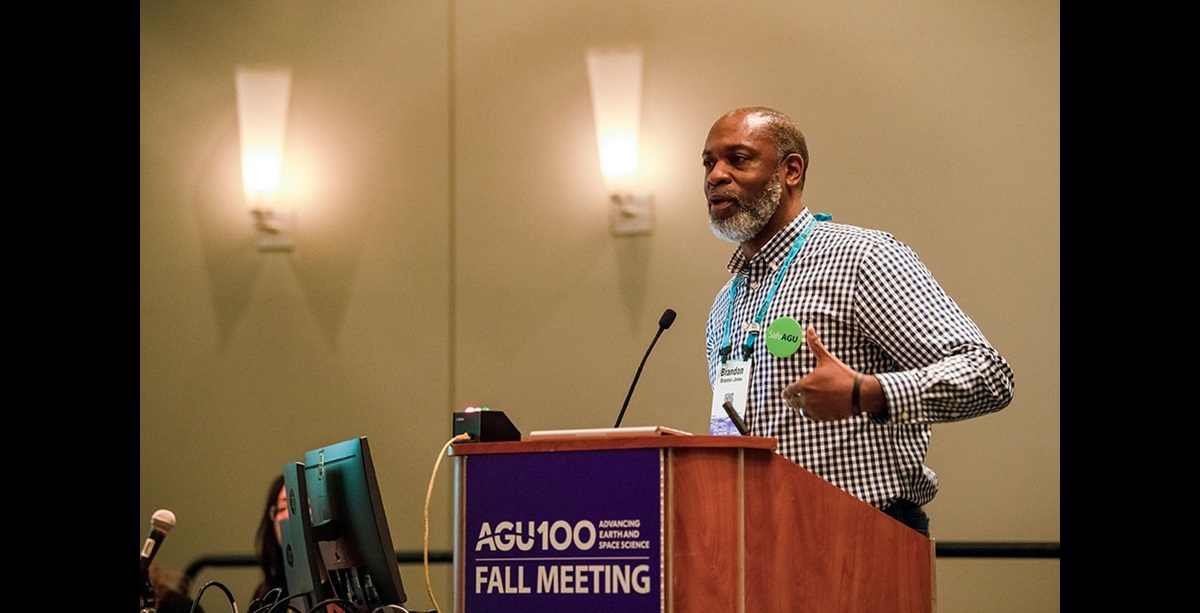
Abstract fees
A flat fee of $70 USD will be charged for each regular submission and a flat fee of $40 USD for each student submission. The abstract submission fee is a required and nonrefundable processing fee and not based on approval of your abstract submission or attendance at AGU Fall Meeting.
There is no fee for individuals residing in qualifying low-income and lower- middle-income countries, as defined by the World Bank.

-
Do not withdraw a paid abstract submission to make edits or submit a new abstract. Refunds will not be issued for abstracts that are withdrawn and resubmitted, and payment will be required for any resubmissions.
-
After an abstract is submitted, it can be accessed and edited until the abstract submission deadline (29 July 2020). After this deadline, edits cannot be made.
-
The only method of payment accepted for abstract fees is by credit card (Visa, MasterCard, or American Express) in the abstract submission system. Wire payments or purchase orders cannot be accommodated.
-
The abstract submission fee does not register you for the meeting. Separate registration fees apply. All presenters must register in order to attend AGU Fall Meeting. Online AGU Fall Meeting registration will be open in mid-August.

Important dates for abstract submission
-
1Mid-June 2020: Session proposal acceptance notification letters are sent; the abstract submission site opens; and the invited author tool opens.
-
2Mid-July 2020: Town hall and workshop proposal notification letters are sent.
-
329 July 2020: Abstract submissions close at 11:59 p.m. EDT.
-
4August 2020: Fall Meeting Program Committee allocates and schedules sessions. At least one convener for each session (an AGU member) must be available to discuss mergers of sessions and schedule sessions in online program.
-
5Early October 2020: Authors are notified of the acceptance, format, and schedule of their abstracts, and the official scientific program is available.
-
6October 2020 through Fall Meeting: Authors are expected to confirm their participation; Conveners are expected to monitor the final program for withdrawals and presenter changes.

Final program and help with the abstract process
In early October, acceptance notifications will be distributed via email, and the final scientific program will be available online.
If you wish to cite an abstract presented at this meeting, please cite as: Author(s) (2019), Title, Abstract (Final paper number, ex: AH14B-1234) presented at 2019 AGU Fall Meeting, San Francisco, CA, 9-13 Dec.
For help with the abstract process
Technical support – For questions about the submission site or technical issues, complete the request form on the submission site, or call +1 401.334.9903 (support code 1438), Monday to Friday between 8:30 a.m. and 6:00 p.m., ET or send an email.
Scientific Program – Email us if you have a question on AGU’s scientific program policies or general procedures, contact the AGU Scientific Program Management Team.
AGU Membership – If you have a question on your membership status or need assistance with your AGU membership account, contact the AGU Membership Services Team or call 800.966.2481 (toll-free in North America) or +1 202.462.6900.

Additional resources for abstract submissions
-
How to write an AGU abstract – Check out this Eos article for pointers on how to write an abstract for an AGU meeting.
-
Register for Fall Meeting – Find information on AGU Fall Meeting registration including rates and policies for attendees.
-
Austin Endowment for Student Travel – Help send more students to Fall Meeting by donating to the Austin Challenge.
-
Outstanding Student Presentation Award (OSPA) Program – Learn how to participate in OSPA as a student or as a judge.
-
Travel grants – Discover available student and early career travel grants to help you attend Fall Meeting.
-
Berkner Travel Fellowship – Berkner Fellowships provide funding for early career scientists and students from countries designated by the World Bank as “low” or “lower-middle” income to present research at AGU-sponsored meetings.
-
AGU Ethics Policy (PDF) – Download a PDF copy of the AGU Scientific Integrity and Professional Ethics Policy.
-
iThenticate – Utilize plagiarism detection software from iThenticate upon submission to identify any duplication.
-
Publicity for meeting abstracts – If you think your abstract is newsworthy, you can tell AGU’s public information office about it for potential publicity.
-
Fall Meeting Program Committee – View the Fall Meeting Program Committee members by section.

Volcanology, Geochemistry and Petrology
CLOSED: V058. Birth of a volcano: The 2018-9 Mayotte seismic-volcanic
This session closed on 26 August 2019, at 11:59 p.m. ET.
The region east of Mayotte island (western Indian ocean) has been undergoing a seismo-volcanic crisis since May of 2018, including hundreds of earthquakes per day, significant geodetic motions and low frequency tremors. These events appear to be associated with the creation of a large new seafloor volcano, 50 km east of the island. The region has a significant volcanic history but a debated volcanic and tectonic context: the Mayotte events could help us to understand the regional context, illuminate the interplay between volcanism and tectonic stresses, and explore processes of crustal accretion. We request presentations in all Earth Science domains pertaining to this phenomenon and its geodynamic context, as well as comparisons to other major volcanic events and seismic/geodetic observations.
